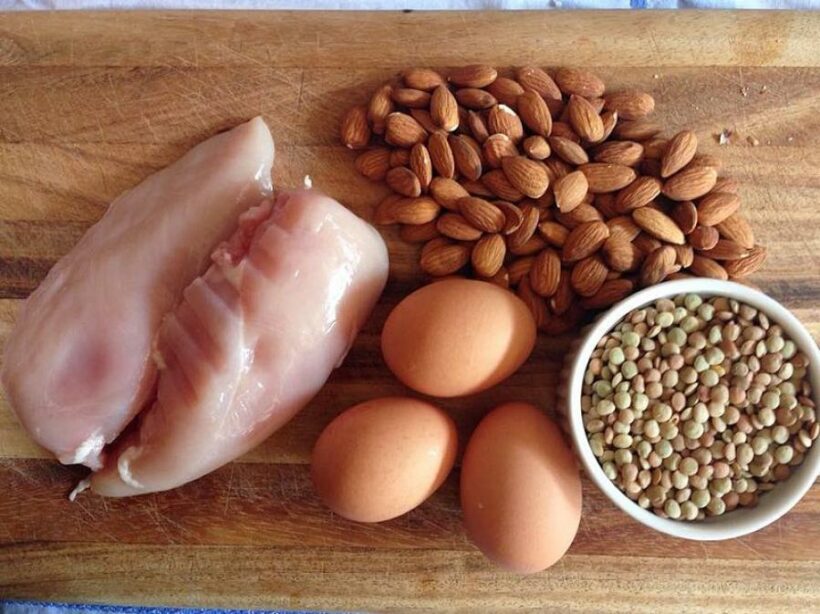Excuse Buster: Importance of protein in our daily diets

PHUKET: I recently consulted with a client who was preparing for a triathlon here. It was clear from his lab results and symptoms (poor recovery and fatigue) that his protein consumption was too low. When we analyzed his daily protein amount, it was only about 50gs per day, when it was clear based on his weight and training routine that he needed to consume nearly double that amount.
Protein pros and cons
Most people recognize the main role that protein plays in our health, namely being the building blocks of the body for bones, muscles, cartilage, skin and blood. Protein also contributes to the formation of essential enzymes the are catalysts for reactions. It also supports hormone production – without these we are in serious trouble. Additionally, it is crucial for those trying to reduce overeating, as it suppresses appetite. So we need enough protein for life. The Greeks were not far off in calling this macronutrient proteos, meaning the first one or the most important one for good reason.
While too little protein creates numerous problems in the body, including lack of growth and development, we can have too much of a good thing too.
What happens if you eat too much protein? Here is a list of possibilities:
- Kidney issues
- Accelerated aging through excess growth hormone production
- Fat storage (excess protein not used by the body can be converted to sugar and stored as fat)
- Blood sugar balance issues (high protein foods can spike insulin)
So what is the right amount of protein for you?
Well to start with, the Recommended Dietary Allowance (RDA) for protein is 0.8g of protein per kilogram of body weight. This is very controversial, but I personally recommend people starting with 1 -1.5g of protein per lean mass kilogram and the bigger number for the more active people or those wanting to increase muscle mass.
So if you weigh 80kg, but you feel your ideal weight is closer to 70kg and you are moderately active, you might aim for between 70-90g per day. To put this into practice, if you have 3 meals per day then that may work out to be around 25-30g of protein per meal.
Below I have some ideas of protein amounts per weight to give you an idea of how each meal could be made up in protein amounts.
However I recommend people not just focus on the number of grams of protein but also the quality, as, in my opinion, this is the key to health and not all proteins are the same. Processed meats, for example, have links with diseases including cancer and should be avoided where possible. If possible, when it comes to animal products, aim for wild, free range, grass fed and natural produce. I have also included many vegetarian sources, which, if you are vegetarian, you should aim to combine with as many sources as possible (grains, nuts, seeds, beans and so on) to get a good amino acid profile.
Animal Products
100g uncooked lean chicken breast = 30g protein
100g raw Atlantic salmon = 20g protein
100g lean beef = 26g protein
3 large eggs = 18g of protein
Nuts and Seeds
1 ounce/28g raw almonds = 6g protein
1/2 cup ground almond meal = 10g protein
1 ounce/28g raw sunflower seeds = 6g protein
2 tbsp chia Seeds = 5g protein
Grains
100g cooked quinoa = 4.4g protein
100g cooked oatmeal = 2.5g protein
100g cooked wild rice = 4g protein
100g cooked brown rice = 2.6g protein
Beans and Legumes
100g cooked kidney beans = 8.7g protein
100g tempeh = 18g protein
100g cooked lentils = 9g protein
2 tbsp peanut butter (technically a legume) = 7g Protein
Dairy
1/2 cup Greek yogurt = 23g protein
1/2 cup cottage cheese = 23g protein
Vegetables
1 cup spinach = 5g protein
1 cup tomato = 6g protein
30g of protein powders
Hemp = 15g protein
Pea = 20g protein
Brown rice = 20g protein
Craig Burton is a Certified Sports Nutritionist (CISSN) with a Bachelor of Science degree (Sports Science) and a National Academy of Sports Medicine (PES) certification.
— Craig Burton
Latest Thailand News
Follow The Thaiger on Google News:


























